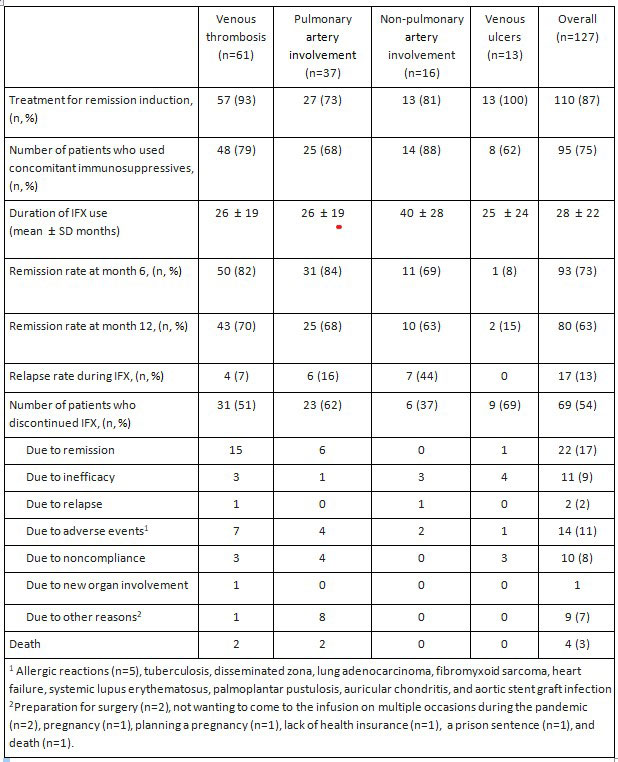Session Information
Date: Sunday, November 13, 2022
Title: Vasculitis – Non-ANCA-Associated and Related Disorders Poster II
Session Type: Poster Session C
Session Time: 1:00PM-3:00PM
Background/Purpose: Vascular involvement is an important cause of morbidity and mortality in patients with Behçet syndrome (BS). We aimed to survey the efficacy and safety of infliximab (IFX) in BS patients with vascular involvement followed in a dedicated tertiary center.
Methods: Charts of all BS patients who used IFX for vascular involvement between 2004-2021 were reviewed. Primary endpoint was remission at month 6, defined as no new clinical symptoms/findings associated with a vascular lesion, no worsening of the primary vascular lesion, no new vascular lesions on imaging, and CRP< 10 mg/dL. For patients with venous ulcers, remission was defined as the total healing of the existing venous ulcers. Relapse was defined as development of a new vascular lesion or recurrence of a preexisting vascular lesion.
Results: Among the 127 patients (102 men, mean age at IFX initiation: 35.8 ± 9 years) treated with IFX, 110 (87%) received IFX for remission induction of whom 87 (79%) being refractory to conventional immunosuppressives and 17 received IFX for maintenance therapy. Overall, remission rate was 73% (93/127) at month 6 and 63% (80/127) at month 12. For subgroups,the remission rate was 82% (50/61) and 70% (43/61) among patients with venous thrombosis, 84% (31/37) and 68% (25/37) among those with pulmonary artery involvement, 69% (11/16) and 63% (10/16) among those with non-pulmonary artery involvement, and 8% (1/13) and 15% (2/13) among those with venous ulcers at month 6 and at month 12, respectively. 17/100 (17%) patients experienced 22 relapsesduring a mean follow-up of 28.4 ± 21 months of IFX therapy.Among the 22 relapses, 12 were progression of a pre-existing vascular lesion and 10 were new vascular lesions. Fourteen patients discontinued IFX due to adverse events. These were: allergic reactions (n=5), infections (n=3), malignancy (n=2), paradoxical reactions (n=3), anda heart failure. Four patients had died the reasons being lung adenocarcinoma, sepsis, and pulmonary hypertension related right heart failure due to pulmonary artery thrombosis (n=2), respectively.
Conclusion: Infliximab seems to be highly effective in BS patients with venous thrombosis and pulmonary artery involvement even among those who are refractory to immunosuppressives and glucocorticoids. .The remission rate was somewhat lower among patients with non-pulmonary artery involvement and no remission could be achieved in the majority of patients with venous ulcers.
To cite this abstract in AMA style:
Hatemi g, Tukek N, Esatoglu S, Ozguler Y, Taflan S, Melikoglu M, Ugurlu S, Fresko I, Kutlubay Z, Yurdakul S, Yazici H, Hamuryudan V. Outcome of Vascular Involvement of Behçet Syndrome Treated with Infliximab: A Retrospective Cohort Study [abstract]. Arthritis Rheumatol. 2022; 74 (suppl 9). https://acrabstracts.org/abstract/outcome-of-vascular-involvement-of-behcet-syndrome-treated-with-infliximab-a-retrospective-cohort-study/. Accessed .« Back to ACR Convergence 2022
ACR Meeting Abstracts - https://acrabstracts.org/abstract/outcome-of-vascular-involvement-of-behcet-syndrome-treated-with-infliximab-a-retrospective-cohort-study/

